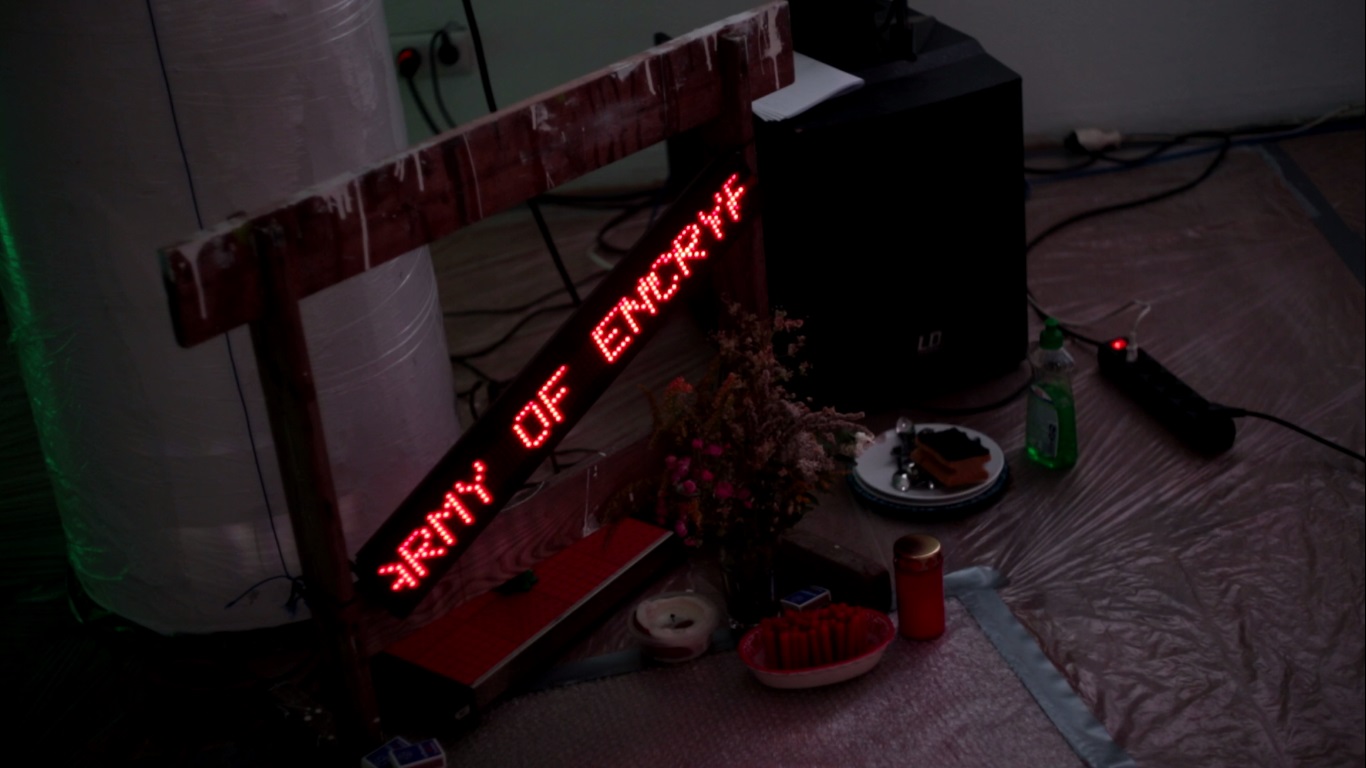Seit 2006 finden in der Lettrétage ca. 120 öffentliche Literaturveranstaltungen jährlich statt – Lesungen, Workshops, Diskussionsrunden, literarische Performances und Formate dazwischen. Bekannte und unbekannte Autor*innen und Künstler*innen verschiedener Sprachen und Nationalitäten sind hier schon aufgetreten.
Seit 2013 liegt der Programmfokus u.a. auf neuen Wegen der literarischen Präsentation und Live-Produktion: Dazu zählen u.a. die internationalen bzw. transnationalen Literaturfestivals „Soundout!“, „¿Comment!“, „Berlinisi“ und „Syn_Energy“, aber auch das viel beachtete Netzwerkprojekt „CROWD“ und multimediale Projekte wie die Reihe „CON_TEXT“ oder das „Poetry Audio Lab“. Eine vollständige Liste der Lettrétage-Projekte finden Sie hier.
Als Ankerinstitution für die freie Literaturszene Berlins stellt die Lettrétage außerdem ihre Räume für Literaturveranstaltungen aller Art zur Verfügung. Zahlreiche freie Veranstalter*innen nutzen unsere Infrastruktur regelmäßig – für Literatur-Workshops, Lesereihen in verschiedenen Sprachen und Buchpräsentationen. Mehr zu den Möglichkeiten der kostenlosen Raumnutzung erfahren Sie hier.
Auf dieser Seite präsentieren wir einen nicht vollständigen Einblick in unser vergangenes Programm.
Veranstaltungen
Termin Informationen:
-
Fr08Dez202320:00Lettrétage in der Veteranenstraße 21, Eintritt: 5,-
Live electronics & poetry: Love&Democracy Part 3
Concert featuring the voices of Ellen Hinsey, Katherina Oguntoye, Carolyn Gammon, Mariam Rasheed, Isaac Goodman.

(c) Paul Brody Composer and sound artist Paul Brody will perform his third set of musical compositions inspired by the voices of poets he recorded. The poets in this round will share their sense of belonging and exclusion. Poet, community builder and activist Katherina Oguntoye, for example, tells about growing up Afro-German in Zwickau, while the young queer poet Isaac Goodman satirically recounts how they discussed femininity with their doctor.
To create a unique soundscape for each voice, Brody asked the poets for the sounds they associate with their selected poem. He put the collected sounds into the sampler he will play as custom made musical instruments. His compositions will not only function as a musical translations of the poems, but also reflect the five unique sound worlds that the poems have been written in.
Scientist and artist Mariam Rasheed ponders on the Arabic word for the quality of being foreign, which she translates as foreignness to describe talking with her grandmother about living in Berlin. Historian and activist Carolyn Gammon shares a poem about the significance of music during her mother’s last years with Alzheimer's disease. Poet and political essayist Ellen Hinsey questions our ability to interpret sanely the world at all.
 (c) Dirk Hasskarl
(c) Dirk HasskarlPaul Brody's sound art and composition can be heard on numberous feature for WDR, the Jewish Museum Berlin andthe Humboldt Forum. He was artist in residence at the Munich Kammerspiele, the Toronto Language Museum, and at the Museum's Quartier, Vienna. His compositions and trumpet playing can also be heard in collaboration with John Zorn, Clueso, David Moss and David Marton. He recently finished an opera commission for Opéra national de Lorraine, a symphonic work for the Oldenburg Symphony. His second opera for 2024 and symphonic work for 2025 will be heard at the Badisches Staatstheater Karlsruhe.
Carolyn Gammon is a canadian author and activist. She has lived in Berlin since 1992. She has worked in the fields of anti-racism, Holocaust studies, and for LGBTQ+ rights. Her most recent book is about memory loss and living life to the fullest.
Isaac Goodman is a queer Jew called Bread in real life. In between the day to day struggle of surviving under late stage capitalism they make art sometimes.
Mariam Rasheed is an artist and scientist from Egypt and based in Berlin since 2015. In her works she explores the societies and ideologies that shaped and regretted her, her childhood and herself.
Ellen Hinsey is the author of nine books of poetry, essays, dialogue and literary translation. Hinsey received the Yale Younger Poets Award, the Berlin Prize fellow of the American Academy in Berlin, and is a is a National Poetry Series Finalist. Her work has appeared in The New York Times, The New Yorker, The Irish Times, Der Tagesspiegel, Poetry, Poetry Review, The Paris Review and others.
Katharina Oguntoye ist eine afrodeutsche Historikerin, Künstlerin, Aktivistin und Unternehmerin. Bekanntheit erlangte Katharina Oguntoye als Mitautorin und Mitherausgeberin des Buches FARBE BEKENNEN. AFRO-DEUTSCHE FRAUEN AUF DEN SPUREN IHRER GESCHICHTE, Berlin, 1986. Sie ist Mitbegründerin des Vereins JOLIBA-Interkulturelles Netzwerk in Berlin e.V. (1997), den sie 25 Jahren lang leitete. In den letzten Jahren erhielt sie mehrere Preise für ihr Lebenswerk.
The sound installation is mostly in English – and some German.
The elevator in the building is currently not operational. We apologize for this issue, as it restricts access to some extent.
Workshops & Infoabende
Termin Informationen:
-
Mi04Apr201820:00Eintritt 5/3 €
Die arabische Moderne
Zeitgenössische arabische Kultur: Von Beschreibung zu Veränderung (Linguistische und soziologische Perspektiven). Mit Mohammed Chawich .
Chawich analysiert in seinem Vortrag die Hauptströmungen der arabischen Kultur aus linguistischer und soziologischer Sicht und diskutiert die Konzepte 'Modernität' und 'Tradition' aus neuer Perspektive. Seine These ist, dass es eine besondere Version der Moderne in der arabischen Welt gibt, eine arabische Moderne, die unabhängig und eigenkonstitutiv ist.
Durch diese These werden die folgende Fragen aufgeworfen, die in der Veranstaltung diskutiert werden sollen:
1) Wie sollen die Grundkomponenten der zeitgenössischen arabischen Kultur klassifiziert werden?
2) Was ist traditionell und was ist modern an diesen Komponenten?
Beispiele: wie „traditionell“ ist 'Islamismus' und wie „modern“ ist der arabische 'Modernismus'?

©Constanze Josting Mohammed Chawich ist Palästinenser, geboren 1961 in Damaskus, und veröffentlicht seit 1989 Artikel und Bücher zumThema "zeitgenössische arabische Kultur".
Publikationen (nur in arabischer Sprache erschienen):
(Entfremdung und Liebe- Psychologie der entfremdeten Persönlichkeit), Beirut 1995.
(Für eine authentisierte Kultur), Beirut / Damaskus 2007.
Malik Bin Nabi und die aktuelle Situation), Damaskus 2007.
Gescheiterte Renaissance), Damaskus 2008.
(Almaqasid-Approach bei al-Qaradawi), Damaskus 2009.
(Wer ist aktiv? das angemessene Bewusstsein in einer gefährdeten Gesellschaft) - Beirut 2015
(Die zeitgenössische arabische Kultur – von Analyse zu Veränderung) 2018.Veranstaltung in arabischer Sprache. Fragen und Diskussionsbeiträge sind in Englisch und Deutsch möglich, der Vortrag selbst wird nicht gedolmetscht.
Moderation: Amani Al-Siefy
